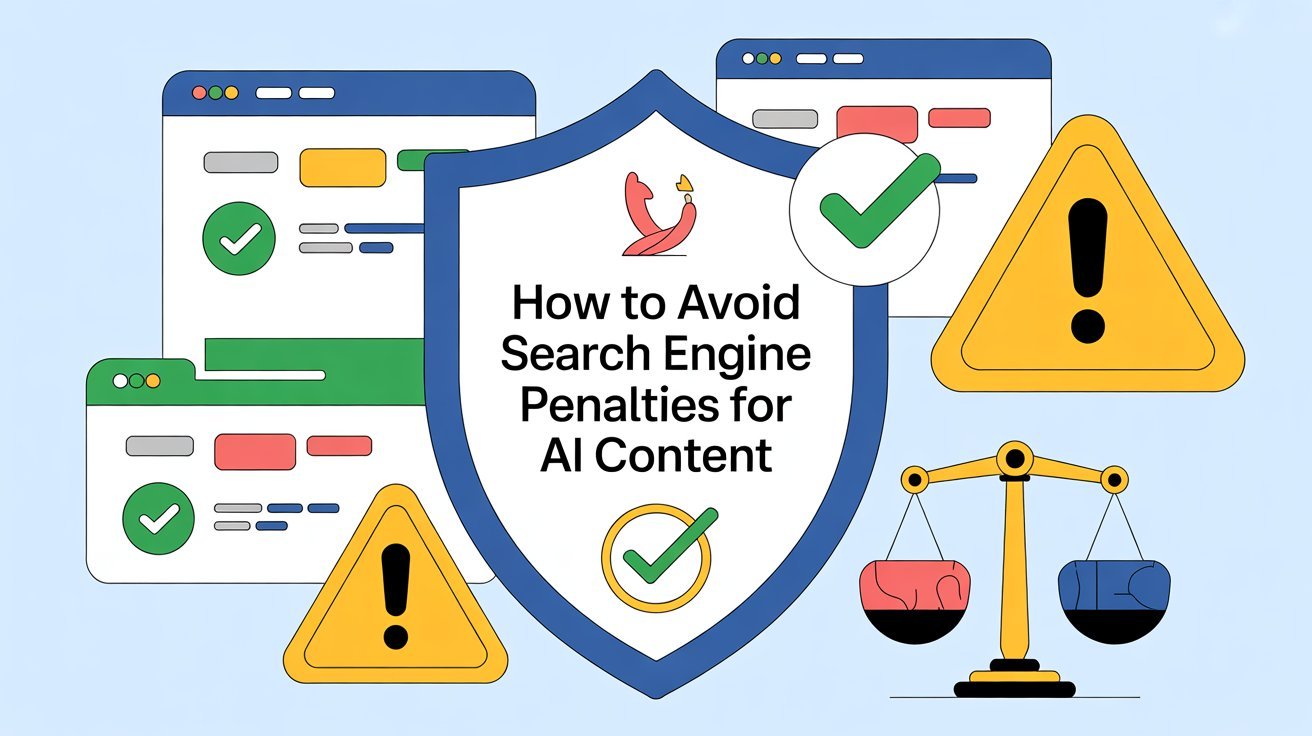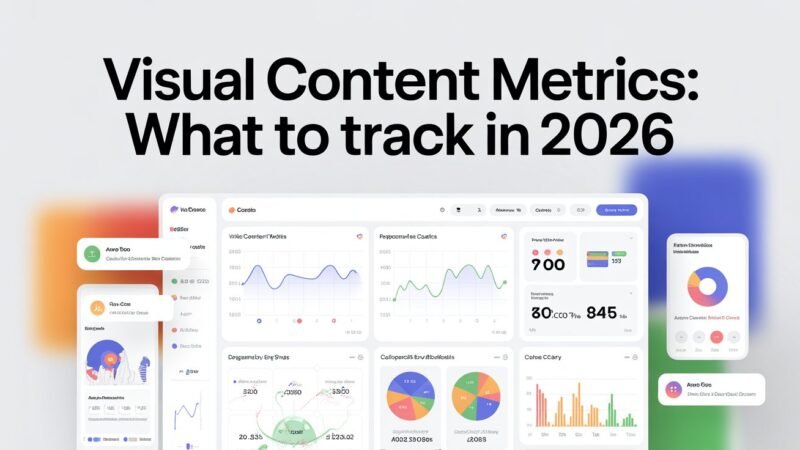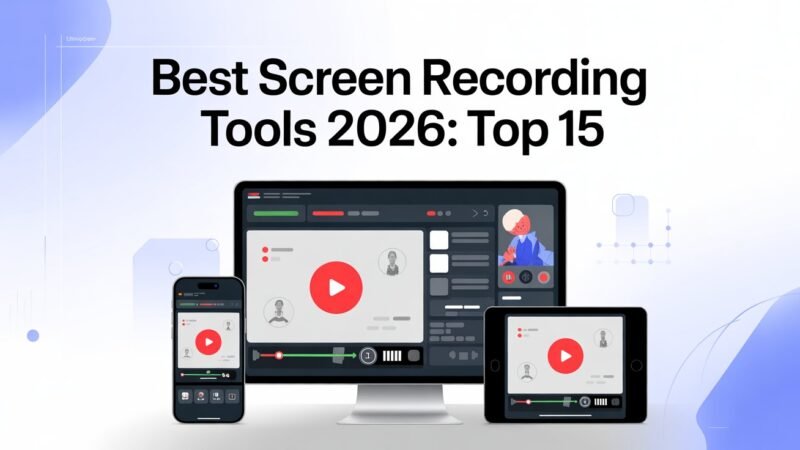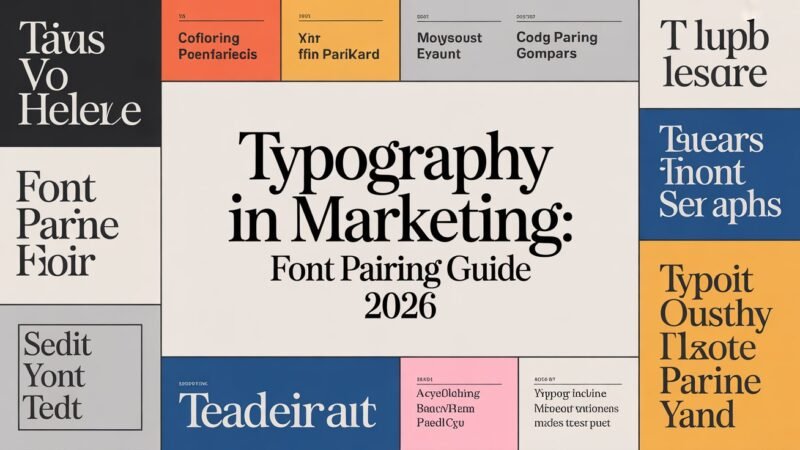To avoid search engine penalties for AI content, focus on originality and quality. Create unique, engaging material that resonates with your audience. Use effective keyword strategies and place keywords naturally throughout your content. It is crucial to maintain proper citations to build credibility and avoid plagiarism issues. Regularly update your content to keep it relevant and compliant. There’s even more you can explore to enhance your content strategy and boost your visibility online.
Table of Contents
Key Takeaways
- Ensure all AI-generated content is reviewed and refined by a human to enhance accuracy and contextual relevance.
- Avoid keyword stuffing by maintaining natural language and focusing on semantic relevance in your content.
- Regularly update content to reflect the latest trends, statistics, and insights, ensuring ongoing relevance and accuracy.
- Use proper citations to acknowledge original creators and enhance credibility, avoiding plagiarism and potential penalties.
- Monitor website analytics to track traffic, engagement, and compliance, adjusting content strategies based on user behavior and feedback.
Understanding Search Engine Guidelines
When you create content, understanding search engine guidelines is vital to avoid penalties. Search engine algorithms prioritize content quality, so it’s important to craft valuable, relevant material.
Familiarize yourself with the latest updates from major search engines like Google; they regularly refine their algorithms to enhance user experience. Avoid keyword stuffing and guarantee your content is original and informative.
Focus on providing answers to common questions or problems your audience faces. Use clear headings and subheadings to improve readability, making it easier for both users and search engines to navigate your content. Additionally, consider utilizing analytics solutions to help you track your content’s performance and make data-driven improvements.
The Importance of Originality in Content
Originality in your content is essential for standing out in a crowded digital landscape. Unique perspectives not only engage readers but also help you avoid penalties from plagiarism detection tools. Embracing creative content strategies can set you apart and keep your audience coming back for more. Additionally, maintaining workflow efficiency in your content creation process can significantly enhance your productivity and originality.
Unique Perspectives Matter
While many creators might feel tempted to follow popular trends, offering unique perspectives is essential for standing out in a crowded digital landscape. By sharing unique viewpoints and diverse narratives, you not only engage your audience but also build trust and authority. Here’s a simple breakdown of why originality matters:
| Benefit | Example | Outcome |
|---|---|---|
| Increased Engagement | Personal stories | Higher reader retention |
| Enhanced Authority | Expert insights | Greater credibility |
| Improved SEO | Unique keyword usage | Better search rankings |
| Audience Loyalty | Relatable content | Repeat visits |
| Differentiation | Unique angles | Standing out from competitors |
Incorporating your distinct voice will keep your content fresh and appealing. Embrace originality, and watch your digital presence flourish!
Plagiarism Detection Tools
To maintain your content’s integrity and avoid search engine penalties, leveraging plagiarism detection tools is essential. These tools guarantee that your content is original and valuable, keeping you in good standing with search engines.
Here’s why you should use them:
- Reputation Protection: Avoid the risk of being labeled as untrustworthy.
- Enhanced Credibility: Original content boosts your authority in your niche, attracting more readers.
- Tool Effectiveness: Discover how well your content holds up against others, assuring you’re always ahead.
Investing in plagiarism detection not only safeguards your work but also elevates your overall content quality.
Creative Content Strategies
Creating unique and engaging content is essential for standing out in today’s crowded digital landscape.
To capture your audience’s attention, focus on creative brainstorming. Start by exploring fresh ideas that resonate with your target demographic.
Use surveys, social media polls, or feedback forms to understand what they truly want.
Balancing AI Assistance With Human Oversight
As you integrate AI tools into your content creation process, it’s essential to maintain a strong balance with human oversight. This combination not only enhances the quality but also preserves the unique touch that only human creativity can provide. Here are three key areas to focus on:
- Content Refinement: Use AI for initial drafts, but let human intuition guide the editing processes.
- Quality Assurance: Always guarantee accuracy and contextual relevance by reviewing AI-generated content.
- Ethical Considerations: Keep feedback loops open to address any potential biases in AI collaboration. Additionally, ensuring functional links for navigation can greatly improve user experience and accessibility to your content.
Implementing Effective Keyword Strategies
Even though AI can generate content efficiently, implementing effective keyword strategies is essential for ensuring your material reaches the right audience.
Start by conducting a competitive analysis to identify relevant long tail keywords that align with search intent. Maintain an ideal keyword density throughout your content while focusing on semantic relevance to enhance your topical authority.
Pay attention to keyword placement, ensuring it appears in headings and meta descriptions for better on-page optimization.
Utilize content clustering to organize related topics, improving user experience by guiding readers through your material seamlessly. Additionally, be mindful of potential errors or broken links, as these can negatively impact user experience and search engine rankings.
Ensuring Content Relevance and Value
To create content that truly resonates, you need to understand your target audience. Effective keyword research plays an essential role in this process, guiding you to what your readers are searching for. Additionally, focusing on workflow optimization can significantly enhance the effectiveness of your content strategy.
Understand Target Audience
Understanding your target audience is essential for creating content that resonates and holds value. To effectively engage your audience, focus on these key aspects:
- User Personas: Develop detailed profiles that reflect your audience’s demographics and motivations.
- Audience Segmentation: Divide your audience based on behavioral trends and content preferences to tailor your messaging.
- Feedback Mechanisms: Implement strategies to gather insights on your audience’s content needs and interests.
Keyword Research Importance
When you prioritize keyword research, you’re not just enhancing your SEO strategy; you’re ensuring your content remains relevant and valuable to your audience.
By using keyword tools, you can identify the terms and phrases your target users are searching for. Understanding search intent is vital, as it helps you create content that meets their needs and expectations.
This way, you’re not only attracting traffic but also engaging visitors who find genuine value in what you offer. Focusing on the right keywords helps you position your content effectively, driving organic search results.
Ultimately, thorough keyword research lays the foundation for successful content creation that resonates with your audience and avoids penalties from search engines.
Quality Over Quantity
Focusing on keyword research sets the stage for your content strategy, but the real game-changer lies in prioritizing quality over quantity.
When you emphasize content depth, you foster genuine audience engagement, making your content not just seen but truly valued.
Here’s how to guarantee your content resonates:
- Research Thoroughly: Dive deep into topics to provide well-rounded perspectives.
- Craft Unique Insights: Share your unique experiences or insights that others might overlook.
- Engage Emotionally: Use storytelling to connect with your audience on a personal level.
Avoiding Duplicate Content Issues
To steer clear of search engine penalties, you must prioritize originality in your AI-generated content. Duplicate content can harm your site’s visibility and credibility, so focus on creating unique and engaging material.
Start by brainstorming fresh ideas or angles on topics relevant to your audience. Utilize AI tools to assist in generating creative concepts, but guarantee the final output is distinct and not simply a rehash of existing content.
Additionally, regularly audit your website for any unintentional duplicate content, as this can occur over time. When in doubt, aim for clarity and depth in your writing. Moreover, understanding project management tools can help streamline your content creation process and enhance productivity.
Utilizing Proper Citations and References
When you create AI content, proper citations and references are essential for maintaining credibility and avoiding penalties.
Understanding different types of citations and following best practices can greatly enhance your work.
Let’s explore why attribution matters and how to implement it effectively.
Importance of Attribution
Attributing your sources not only boosts the credibility of your content but also helps you steer clear of search engine penalties. Proper citation practices enhance your work’s integrity and reflect your commitment to attribution ethics.
Here are three reasons why citation is essential:
- Crediting sources fosters trust and transparency with your audience.
- Acknowledgment practices respect the original creators, promoting ethical attribution.
- Citation importance safeguards you against plagiarism and potential penalties.
Utilizing various referencing styles and adhering to attribution guidelines can elevate your content.
Types of Citations
Proper citations come in various forms, each serving a unique purpose in enhancing your content’s credibility. Different citation styles, like APA or MLA, help you maintain reference accuracy.
When you use academic references and online resources, it’s vital to guarantee source credibility for ethical sourcing. Proper attribution not only acknowledges original authors but also aids in content verification.
You should consider citation management tools to organize your references efficiently, minimizing the chances of legal implications that arise from incorrect citations. By following the appropriate citation styles, you can bolster your work’s integrity and avoid potential penalties for AI-generated content.
Ultimately, understanding these types of citations can strengthen your content while protecting your reputation.
Best Practices for References
How can you guarantee your references enhance the credibility of your content? By focusing on reference accuracy and adhering to proper citation styles, you can build trust with your audience.
Here are three best practices to follow:
- Choose Reliable Sources: Use academic journals, reputable websites, and books by established authors to confirm your references are trustworthy.
- Consistent Citation Styles: Stick to one citation style throughout your content, whether it’s APA, MLA, or Chicago. Consistency helps your audience navigate your references easily.
- Double-Check Your Work: Review your citations for accuracy; even small errors can undermine your credibility.
Regularly Updating and Refreshing Content
To maintain your site’s credibility and relevance, regularly updating and revitalizing your content is essential. This practice enhances your content lifecycle, ensuring it stays accurate and engaging for your audience.
By prioritizing content refreshment, you can make sure your information reflects the latest trends, statistics, and insights. Search engines favor fresh content, so updating existing articles or adding new sections can boost your rankings.
Don’t just add dates; revise your content to provide more value. This not only helps you avoid penalties but also keeps your readers coming back for more.
Set a schedule for regular reviews, and you’ll be well on your way to maintaining a healthy, authoritative online presence.
Monitoring Website Analytics for Compliance
While you might focus on creating engaging AI content, regularly monitoring your website analytics is vital for guaranteeing compliance with search engine guidelines.
By keeping an eye on key metrics, you can maintain peak website performance and avoid penalties. Here are three significant areas to track:
- Traffic monitoring: Confirm your site’s visitors are steadily increasing.
- Bounce rates: Keep these low to indicate user engagement and satisfaction.
- Conversion rates: Analyze how many visitors take desired actions.
Utilize analytics tools for compliance checks, perform content audits, and engage in trend analysis.
Data interpretation allows you to adjust your strategy, enhancing both user experience and compliance. Staying proactive means you’re less likely to face penalties down the road.
Best Practices for Ethical AI Content Generation
As you immerse yourself in AI content generation, it’s crucial to prioritize ethical practices that foster trust and integrity.
Start with ethical considerations by guaranteeing AI transparency in your processes. Emphasize content diversity to engage a broader audience and mitigate algorithmic bias.
Foster user engagement through interactive elements that invite feedback, reinforcing audience trust. Focus on content authenticity by sourcing information responsibly and acknowledging AI limitations.
Encourage creative collaboration, blending AI capabilities with human insight to enhance quality and relevance. Regularly assess your strategies to verify they align with ethical standards, promoting a positive relationship with your audience.
Frequently Asked Questions
How Can I Check if My Content Is Ai-Generated?
You can check if your content’s AI-generated by using AI content detection tools. These tools analyze writing style and patterns, helping you verify content authenticity and maintain a unique voice in your work.
Are There Specific Tools to Detect Ai-Generated Content?
Yes, AI detection tools like OpenAI’s Text Classifier and Copyleaks can help you gauge content authenticity. Think of them as your compass, guiding you through the vast digital landscape to guarantee your content’s integrity.
What Are the Consequences of Receiving a Search Engine Penalty?
Receiving a search engine penalty impacts your website’s visibility, traffic, and ranking. You’ll need effective recovery strategies to regain your position, which can involve content updates, improving user experience, and following search engine guidelines.
Can I Use AI to Generate Product Descriptions Safely?
You can use AI to generate product descriptions safely, but remember, “you get what you pay for.” Make certain the content is unique, engaging, and aligns with your brand to avoid potential pitfalls with AI content.
How Often Should I Review My Content for Compliance?
You should review your content regularly, ideally quarterly. Implement a content audit and keep a compliance checklist handy to guarantee everything aligns with current standards. Staying proactive helps you avoid potential issues down the road.
Conclusion
In the vast garden of digital content, nurturing originality is your sun, while AI serves as the rain that helps ideas flourish. By balancing human insight with technological aid, you’re planting seeds of value that attract both search engines and readers alike. As you regularly tend to your garden through updates and ethical practices, you’ll harvest not just traffic, but trust. Stay vigilant, and your content will thrive, avoiding the shadows of penalties while basking in the light of visibility.







